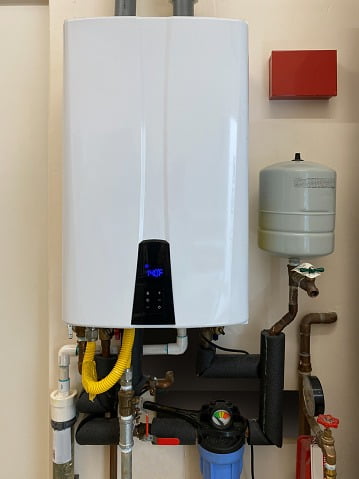For the foreseeable future, most households will be relying on a combi boiler with a regular gas boiler service to ensure that it is working at its best now and for many years to come.
Whilst the immediate future of heating in the home will likely look very similar to the present, the future of heating businesses is a very different matter, as companies look for ways to minimise their overheads and prepare for an uncertain future.
The last few years have seen a major change in how people work with and for each other, with the shape of the modern office looking quite unlike how it did in 2019.
Because of this, businesses are looking for every way they can find to make the most of their resources and reduce their overheads, and one of the more innovative solutions may lie in the digital boiler.
- What Is A Digital Boiler?
A digital boiler is an attempt to fix two problems at once and turn what can commonly be seen as a problem for many internet-enabled businesses into a solution.
Most businesses have a data centre of some kind, which is a building that houses equipment such as servers, storage systems and the centre of a business network.
By design, many of these systems need to be on every day and in some cases need to be running 24 hours a day and seven days a week.
This not only means there is an immense power cost but since these computer systems generate huge amounts of heat, there is also a need to cool down the systems by channelling away the hot air the computer parts generate.
With energy prices increasing exponentially, a way to solve both of these problems may be on the horizon in the form of the digital boiler.
Essentially a small-scale heat pump, a digital boiler consists of the excess heat from a data centre, which enters a heat exchanger and is pumped around a facility to where it is needed.
The principle has been tested at Exmouth Leisure Centre, where it has been used to keep the pool heated at 30 degrees Celsius for 60 per cent of the day, managing to take out two problems at once at a time when a lot of leisure centres are being forced to close due to high costs.
Given that some large-scale data centres run so hot that they have been constructed underwater, in cold areas of the world or in caves with naturally cool climates, the need to channel that heat away could become a major opportunity if that heat can be successfully taken away.
If the concept can be scaled up, it could fundamentally change how a lot of businesses heat their facilities, leading to mutually beneficial agreements such as the one between Exmouth Leisure Centre and data centre provider Deep Green.
In exchange for storing the washing-machine-sized server computer, Exmouth gets a free source of heat, which potentially saves them tens of thousands of pounds a year, and one that is surprisingly efficient in the bargain.

